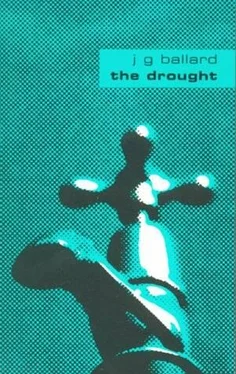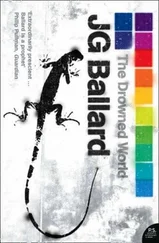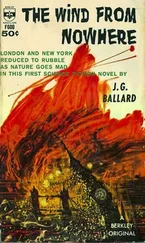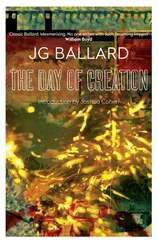Quilter ignored this, and with an ironic grin pointed to the blurred white forms moving slowly below the surface.
"Clouds," he said.
"What?"
"Clouds," Quilter repeated. "Full of water, doctor."
Ransom stepped through the hatchway into the cabin of the houseboat, shaking his head at Quilter's bizarre sense of humor. Despite his deformed skull and Caliban-like appearance, there was nothing stupid or unintelligent about Quilter. The dreamy ironic smile, at times almost affectionate in its lingering glance, as if understanding Ransom's most intimate secrets, the seamed skull with its curly russet hair and the inverted planes of the faunlike face, in which the cheekbones had been moved back two or three inches, leaving deep hollows below the droll eyes-all these and a streak of unpredictable naiveté made Quilter a daunting figure. Most people wisely left him alone, possibly because his unfailing method of dealing with them was to pick unerringly on their weaknesses and blind spots and work away at these like an inquisitor.
It was this instinct for failure, Ransom decided as Quilter continued to watch him from his vantage point above the dead birds, that probably formed the tacit bond between the youth and himself. No doubt Quilter had quickly sensed that Ransom's frequent visits to the houseboat and the solitary weekends among the marshes along the southern shore of the lake marked a reluctance to face up to certain failures in his life. But perhaps he also realized the extent to which Ransom shared that sense of the community of the river, the unseen links between the people living on the margins of the great channel, which for Ransom had begun to take the place of his home and his work at the hospital.
All summer Ransom had watched it shrinking, its countless associations fading as it narrowed into a shallow creek. Above all Ransom was aware that the role of the river in time had changed. Once it had played the part of an immense fluid clock, the objects immersed in it taking up their positions like the stations of the sun and planets. The continued lateral movements of the river, to which Ransom had become more and more sensitive during his visits to the houseboat, its rise and fall and the varying pressures on the hull, were like the activity within some vast system of evolution, whose cumulative forward flow was as irrelevant and without meaning as the apparent linear motion of time itself. The real movements were those random and discontinuous relationships between the objects within it, those of himself and the other denizens of the river, Mrs. Quilter, her son, and the dead birds and fish.
With the death of the river so would vanish any contact between those stranded on the drained floor. For the present the need to find some other measure of their relationships would be concealed by the problems of their own physical survival. Nonetheless, Ransom was certain that the absence of this great universal moderator, which cast its bridges between all animate and inanimate objects alike, would prove of crucial importance. Each of them would soon literally be an island in an archipelago drained of time.
Removing his cotton jacket, Ransom sat down on the bench by the stern window of the cabin. He decided to go ashore, but after a week on board the houseboat he felt uneager to leave it and make all the social and mental readjustments necessary, minimal though these would now be. He had let his beard grow, but almost everyone had left Larchmont and there was little point in shaving it off. Although the rim of black hair gave his thin face a gaunt and Rimbaudesque look, he accepted this new _persona_ as part of the altered perspectives of the river, and as a mark of his own isolation in the houseboat.
He had seen the craft for sale the previous winter, while visiting a patient in the yacht basin. With its pastel blue hull and raked windows it looked totally un-nautical, but the functional design of the interior, and the absence of all overlay of personality, made it a perfect retreat. To the surprise of the other yachtsmen in the basin, Ransom towed the craft away and moored it on the exposed bank below the motorbridge. The mooring was a poor one with a nominal rent, the smells of the fish-quays drifting across the water, but he was alone and the slip road nearby gave him quick access to Larchmont and the hospital. The only hazards were the cigarette ends thrown down from the cars crossing the bridge. At night he would sit back in the steering well and watch the glowing parabolas extinguish themselves in the water around him.
He had furnished the houseboat with far more care than he had given to the home he shared with Judith, and its cabin was a repository of all the talismans of his life. In the bookshelf were the anatomy texts he had used in the dissecting room as a student, the pages stained with the formaIn that had leaked like a bland washed blood from the mutilated cadavers on the tables-perhaps somewhere among them the unknown face of his surgeon father. On the desk was the limestone paperweight he had cut from a chalk cliff as a child, the fossil shells embedded in its surface carrying a quantum of Jurassic time across the millions of years to him. Behind it, like the ark of his covenant, stood a diptych of photographs in a hinged blackwood frame. On the left was a snapshot of himself at the age of four, before his parents' divorce, sitting on a lawn with them. On the right, exorcising the terrors of this memory, was a reproduction of a small painting by Tanguy, 'Jours de Lenteur.' With its smooth pebble-like objects, drained of all associations, suspended on a washed tidal floor, this painting above all others had helped to isolate him from the tiresome repetitions of everyday life.
All these mementos he had smuggled under Judith's nose from their house during the previous months, setting up a small zone of inner reality for himself. Looking around him at the contents of the cabin, Ransom realized that the houseboat was as much a capsule designed to protect him against the pressures and vacuums of time as the steel shell of an astronaut's vehicle protected the pilot from the vagaries of space. Here his unconscious memories of childhood and the past had been isolated, and quantized, like the fragments of archaic minerals sealed behind glass cases in museums of geology.
A siren hooted warningly. An old river steamer, white canvas awnings flared trimly over the rows of empty seats, approached the central passage between the main pylons of the bridge. Captain Tulloch, a thin bottle-nosed old buff, sat above the helmsman on the roof of the wheel-house, staring myopically down the narrowing channel. With its shallow draught, the steamer could glide over submerged banks barely two feet below the surface. Ransom suspected that Tulloch was now half-blind, and that his pointless passages in the empty steamer, which once carried sightseers across the lake, would go on until the craft ran immovably aground on a mudbank.
As the steamer passed, Quilter stepped down into the water, and with an agile leap swung himself on to the handrail, feet in one of the scuppers.
"Whoa, there! Full ahead!" The steamer rocked slightly, and Captain Tulloch hopped from his perch with a cry. He seized a boathook and hobbled down the deck toward Quilter, who grimaced at him from his handhold on the stern rail. Bellowing at the youth, who scuttled like a chimpanzee on its bars, Tulloch rattled the boathook up and down between the rails. They passed below the bridge and approached the Quilters' barge. Mrs. Quilter, still fanning herself, sat up and hurled a series of vigorous epithets at the Captain. Ignoring her, Tulloch drove Quilter forward along the rail, lunging at him like a perspiring pikeman. The helmsman swung the steamer hard by the barge, trying to rock it from its mooring. As it passed, Mrs. Quilter reached forward and jerked loose the line of the coracle. It bounced off the bows of the steamer, then raced like a frantic wheel between the hulls. Quilter leapt nimbly into it from the rail and was safely spread-eagled on the barge's deck as Captain Tulloch swung the boathook at his head, knocking Mrs. Quilter's fan into the water from her hand.
Читать дальше
Конец ознакомительного отрывка
Купить книгу








